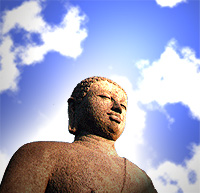Taking the monkey mind on retreat
Bangkok Post, Aug 14, 2005
Bangkok, Thailand -- Living in busy Bangkok, I welcomed the meditation retreat opportunity offered me by my colleagues from Rajabhat Surin University. ``Every Buddhist should meditate,'' I explained to my family. ``Time won't wait for me. I need to do it while I'm still able.''
 Then I added: ``I will also extend the merit I earn to all of you.''
Then I added: ``I will also extend the merit I earn to all of you.''
My family, always reasonable and understanding, nodded. So off I flew to Ubon Ratchathani for the long weekend retreat at the beginning of Buddhist Lent.
Wat Pa Dong Ka, in the district of Lumduan, about 20 kilometres off Muang Surin, was beautiful and calm. It was founded by the late Luang Pu Dool, a famous meditation teacher in Surin, following the tradition of the forest meditation monastery established by his own teacher, the great guru of Isan, Luang Pu Mun.
Many merit-makers came to the temple to present alms and candles to mark the beginning of the three-month Buddhist lent. Buddhist monks, since the time of the Lord Buddha, would annually take an oath to respect lent and to meditate only within the temple compound in order to avoid disturbing the environment in springtime.
Luang Po Pattana, the current abbot, acknowledged our pledge to practice meditation at his temple and solemnly gave us instructions about the rules of his community.
Late morning and afternoon would be free for individual reading, cleaning or walking meditation. Fruit juice would be served at two. At six in the evening, all monks, nuns and lay people would gather at the sala for prayers and meditation until nine, when all would return to their living quarters. Electricity and noise would be kept to a minimum.
In the morning, from three to five-thirty, all would come to the sala for meditation and prayers. At six, the monks would walk into the villages with bowls in their arms to beg for food, returning at seven-thirty. The nuns would put all the food from the monks' bowls into two sets of trays, one for the monks and another for the nuns and other people. At eight, everybody would take as much food as they needed from the trays and eat their single daily meal. All remaining food would be put in bags and given to the poor children in the villages.
My friends and I received the eight precepts from the abbot, changed into white garments and went to the evening meditation session on time. The 12 monks sat on a raised platform while the laymen from the village and the three nuns who had been with the temple from the day it was founded took their seats on the floor below.
The chanting of the evening prayers went smoothly, followed by a short lecture on meditation given by the abbot for the benefit of the newcomers. Then all the lights and candles were blown out leaving everyone to quietly work on achieving mindfulness.
My ordeal soon began. My knees, ruined by tennis, consistently protested and my stomach groaned loudly. In the stillness, I heard some of my friends start to snore.
Changing position many times, I let my mind wander around the world and shift back and forth in time and space.
I remembered reading from my mother's book that our mind was like a monkey, always jumping about actively. To train it we must follow it, empty it of useless thoughts and focus it on our in-and-out breaths.
All evening I kept chasing my monkey-like mind, pulling it back again and again to watch over my breathing, yet it quickly escaped on its own never-ending journey to unfathomable lands.
``Stop and stay still!'' I called out to the monkey. ``Why?'' it yelled back. ``Because we need to be still together so that we can learn to develop ourselves and attain some wisdom,'' I argued.
The monkey laughed and leaped away saying, ``Remember how you tirelessly ran after the lemurs in Madagascar last year? You used to enjoy it then.''
``Yes,'' I said, ``but we are here for a different purpose and I need to tame you now, even if only for a moment. Come here and say a short prayer with me.''
I fought hard with the monkey inside me. The agility that used to foster my creativity and my decisiveness now obstructed my path to peace within myself. Angry yet undaunted, I kept repeating, in monosyllabic muteness, the short prayer that was meant to soothe the two of us. Outside the rain cooled the air as nocturnal creatures stirred and sang to the soft wind while the leaves shook and danced.
The clock chimed nine. Then a gecko on the ceiling called out nine times.
I looked at my monkey and it looked back at me, happy and contented, for what seemed like an eternal second. Then I opened my eyes feeling fresh and awake. Somehow I knew that my monkey-mind and I had become more spiritually and intellectually bonded, and that both of us would rest peacefully that night.
Tomorrow would be a new day.

 Then I added: ``I will also extend the merit I earn to all of you.''
Then I added: ``I will also extend the merit I earn to all of you.''